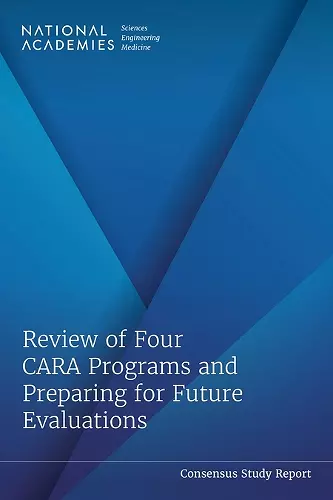Review of Four CARA Programs and Preparing for Future Evaluations
Board on Population Health and Public Health Practice author National Academies of Sciences, Engineering, and Medicine author Health and Medicine Division author Committee on the Review of Specific Programs in the Comprehensive Addiction and Recovery Act author Kathleen Stratton editor Kenneth B Wells editor M Kelly McHugh editor Hortensia Amaro editor
Format:Paperback
Publisher:National Academies Press
Published:12th Jul '23
Currently unavailable, and unfortunately no date known when it will be back

The Comprehensive Addiction and Recovery Act (CARA; P.L. 114-198) was signed into law in 2016 to help address the challenges of overdose deaths and opioid use disorder, and to expand access to evidence-based treatment. Among these efforts was the authorization of four grant programs to be overseen by the Substance Abuse and Mental Health Services Administration (SAMHSA).
In 2018, SAMHSA requested that the National Academies establish a committee to conduct a review of the four programs, which focus primarily on opioids, but occasionally include treatment and recovery services for co-occurring substance use disorders. The review resulted in three consensus study reports over five years. This third and final report aims to (1) understand the processes of the four grant programs; actions taken by grantees and their partners; impacts to clients, patients, the community, and public; and structural or environmental changes that might have resulted from grant funding, and (2) analyze how future congressionally mandated evaluations can be structured and carried out to better support policy makers.
Table of Contents- Front Matter
- Summary
- 1 Introduction
- 2 Methods and Approach
- 3 BCOR Findings
- 4 PPW-PLT Findings
- 5 OD Treatment Access Findings
- 6 FR-CARA Findings
- 7 Conclusions About the CARA Programs
- 8 Preparing for Future Evaluations
- 9 Concluding Observations
- References
- Appendix A: Supplementary Program Information
- Appendix B: Contracted NORC Report
- Appendix C: Evaluation Types and Data Requirements
- Appendix D: Committee Member Biographical Sketches <
ISBN: 9780309697538
Dimensions: unknown
Weight: unknown
234 pages